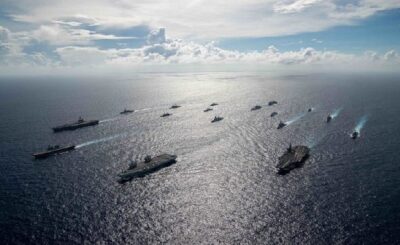-: R Muthu Kumar :-
The US is facing grave risks in the wake of rising global geopolitical tensions and the nation’s domestic political polarisation experts concerned are warning American leaders. America’s global leadership role is being challenged outside by other nations and inside by their own polarised electorate.
Moscow and Beijing are already playing more important roles in the Middle East and North Africa than ten years ago, and in another decade could rival Washington’s influence in the region, according to a recent study.
Washington’s popularity suffered due to its support of Israel’s war in Gaza, but noted that a multitude of other factors could be influencing opinions.
Retired US Army Col. Douglas Macgregor has distinguished himself as a critic of President Joe Biden’s support for Ukraine in the Donbass conflict.Former Pentagon Adviser Col. Douglas Macgregor said Sunday the United States should stop “marching” into foreign nations to expand their political influence.”We need to stop marching into other peoples countries and trying to force people to become like us,” Macgregor said on the X social media platform.
We have lost $ 14 trillion over the last 20 year on dumb interventions in other countries. What good has it done?
Earlier this week US Secretary of State Antony Blinken claimed the US-led NATO alliance is a defensive organization that has “no designs” to seize the territory of any other country in the world. NATO has carried out bombings and interventions in countries including Libya, Yugoslavia, Iraq and Afghanistan over its 75-year history. The alliance also partnered with the US Central Intelligence Agency (CIA) to sponsor Operation Gladio, a covert program that backed far-right paramilitaries throughout Europe.In March, the Russian Mission to the United Nations requested a Security Council meeting to mark the 25th anniversary of the bombing campaign carried out by NATO against Yugoslavia during the Kosovo War in 1999. Several US-aligned states raised objections to the proposed meeting, saying it was not relevant under the UN Security Council agenda category of “threats to international peace and security.”
The United States government has been involved in numerous interventions in foreign countries throughout its history. The U.S. has engaged in nearly 400 military interventions between 1776 and 2023, with half of these operations occurring since 1950 and over 25% occurring in the post-Cold War period.
After the USSR collapsed in 1991, the US emerged as the world’s sole superpower and, with this, continued interventions in Africa, Eastern Europe, and the Middle East. Following the September 11 attacks in 2001, the Bush Administration launched the “war on terror” in which the U.S. waged international counter terrorism campaigns against various extremist groups such as al-Qaeda and the Islamic State in various countries.
After the September 11, 2001 attacks, under President George W. Bush, the US and NATO launched the global War on Terror, which began in earnest with an intervention to depose the Taliban government in the Afghan War, which the U.S. suspected of protecting Al-Qaeda. In December 2009, President Barack Obama ordered a “surge” in US forces to Afghanistan, deploying an additional 30,000 troops to fight Al-Qaeda and the Taliban insurgency, before ordering a drawdown in 2011.
The Bush Doctrine of preemptive war saw the U.S. invade Afghanistan in 2001 and Iraq in 2003. In addition, America expanded its military presence in Africa and Asia via a revamped policy of foreign internal defense. The Obama administration’s 2012 “Pivot to East Asia” strategy sought to refocus U.S. geopolitical efforts from counter-insurgencies in the Middle East to naval activity in East Asia, as part of a policy to counter China’s expansion in the South China Sea, a trajectory also continued by Trump and Biden.
The United States Navy has been involved in anti-piracy activity in foreign territory throughout its history, from the Barbary Wars to combating modern piracy off the coast of Somalia and other regions.
Afghanistan continued to host US and NATO counter-terror and counterinsurgency operations (ISAF/Resolute Support and operations Enduring Freedom/Freedom’s Sentinel) until 2021, when the Taliban retook control of Afghanistan amidst the negotiated American-led withdrawal from the country. Over 2,400 Americans, 18 CIA operatives, and over 1,800 civilian contractors, died in the Afghan War. The war in Afghanistan became the longest war in United States history, lasting 19 years and ten months–surpassing the length of the Vietnam War, which lasted 19 years and five months–and cost the US over $2 trillion.








